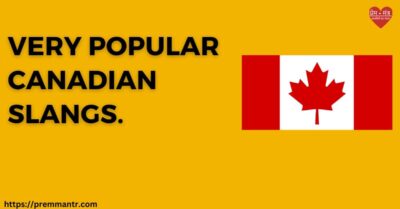Canada, known for its multiculturalism and diverse linguistic landscape, boasts a unique vocabulary filled with intriguing slangs. These very popular Canadian slangs have become an integral part of everyday conversations, adding a touch of authenticity and charm to the Canadian English dialect.
In this article, we will take a delightful journey through some of the most beloved and widely used Canadian slangs, uncovering their meanings and origins.
“Eh” slang meaning
One of the most recognizable Canadian slangs, “eh” is often used as a tag question or to seek agreement or confirmation. It is used to invite others to participate in the conversation or to express a shared sentiment.
For example, “It’s a beautiful day, eh?” or “You’re coming with us, eh?” This versatile slang is deeply ingrained in Canadian culture and is affectionately embraced by Canadians across the country.
“Toque” meaning
Canadians are no strangers to cold weather, and “toque” is the Canadian term for a knitted hat or beanie worn to keep warm. This slang has its roots in the French word “toque,” which refers to a chef’s hat. Whether you’re exploring the snowy landscapes or simply staying cozy during winter, you’ll often hear Canadians asking, “Where’s my toque?”
Read – What is canada known for ? , Exploring Canada
“Double-double” slang meaning
If you find yourself in a Canadian coffee shop, you may hear the term “double-double.” It refers to a popular coffee order consisting of two creams and two sugars. Tim Hortons, a famous Canadian coffee chain, played a significant role in popularizing this term. Ordering a “double-double” has become a unique part of Canadian coffee culture and an instant identifier for locals.
“Loonie” and “Toonie” in canada
When it comes to Canadian currency, “loonie” and “toonie” are widely recognized slangs. The “loonie” refers to the one-dollar coin, featuring the image of a loon, a bird commonly found in Canada. Similarly, the “toonie” represents the two-dollar coin, introduced in 1996, with a polar bear on its face. These slangs have become commonplace in daily transactions and add a touch of playfulness to Canadians’ financial conversations.
“Hoser” canadian slang
The term “hoser” is a classic Canadian slang that originated from the sport of ice hockey. It refers to a person who is seen as clumsy or foolish, often used in a light-hearted and teasing manner. The slang gained popularity through the sketch comedy show “SCTV” and has since become a quintessential part of Canadian humor.
Conclusion of canada slangs
Canadian slangs play a significant role in the country’s linguistic identity, reflecting its cultural diversity and history. From the ubiquitous “eh” to the chilly “toque” and coffee-loving “double-double,” these slangs add a unique flavor to Canadian English conversations. Understanding and embracing these slangs can help you immerse yourself in Canadian culture and foster connections with locals. So, the next time you visit the Great White North, don’t be surprised if you find yourself using these very popular Canadian slangs effortlessly.
